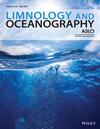Relative size matters: Spawning substrate roughness size and spacing affect egg dislodgement and retention in the benthos
IF 3.8
1区 地球科学
Q1 LIMNOLOGY
引用次数: 0
Abstract
The consequences of hydrodynamic effects on survival of embryonic benthic organisms remain unknown. This is because the interaction of hydrodynamics and substrate roughness is complex, but it can be conceptualized in two dimensions by roughness flow regimes (isolated, wake interference, and skimming flow) or roughness types (相对大小很重要产卵底质的粗糙度大小和间距会影响卵在底栖生物中的移位和滞留
水动力效应对底栖生物胚胎存活的影响尚不清楚。这是因为水动力与底质粗糙度之间的相互作用非常复杂,但可以通过粗糙度流态(孤立流、唤醒干扰流和撇流)或粗糙度类型(k 型和 d 型)在两个维度上进行概念化。我们使用壁面喷射装置研究了不同粗糙度流态/粗糙度类型和粗糙度高度(k)对马眼鱼(Sander vitreus)卵(直径 2 毫米,⌀)脱落的影响。我们预计,在暴露程度较高/遮蔽程度较低的粗糙度类型/流态(即 k 型/孤立粗糙度流态)中,以及当 k ≤ ⌀ 时,需要较低的壁面剪应力 (τw) 才能使卵脱落。令人惊讶的是,结果恰恰相反,这表明在这些粗糙的表面上,其他机制也是导致鸡蛋脱落的原因。当水流流过暴露在粗糙度元素附近的卵(k ≤ ⌀)时,会发生水动力遮蔽,这有效地增加了卵的宽度,因此需要更高的τw来滚动,然后弹射出去。当 k > ⌀时,卵的脱落可能是通过在粗糙度元件之间的沟槽宽度内再循环的涡流中较低的压力而发生的,而不是由于 τw。这些结果表明,在底栖环境中,要提供合适的产卵栖息地,必须对底质元素进行异质分选和大小调整。
本文章由计算机程序翻译,如有差异,请以英文原文为准。
求助全文
约1分钟内获得全文
求助全文
来源期刊

Limnology and Oceanography
地学-海洋学
CiteScore
8.80
自引率
6.70%
发文量
254
审稿时长
3 months
期刊介绍:
Limnology and Oceanography (L&O; print ISSN 0024-3590, online ISSN 1939-5590) publishes original articles, including scholarly reviews, about all aspects of limnology and oceanography. The journal''s unifying theme is the understanding of aquatic systems. Submissions are judged on the originality of their data, interpretations, and ideas, and on the degree to which they can be generalized beyond the particular aquatic system examined. Laboratory and modeling studies must demonstrate relevance to field environments; typically this means that they are bolstered by substantial "real-world" data. Few purely theoretical or purely empirical papers are accepted for review.
 求助内容:
求助内容: 应助结果提醒方式:
应助结果提醒方式:


